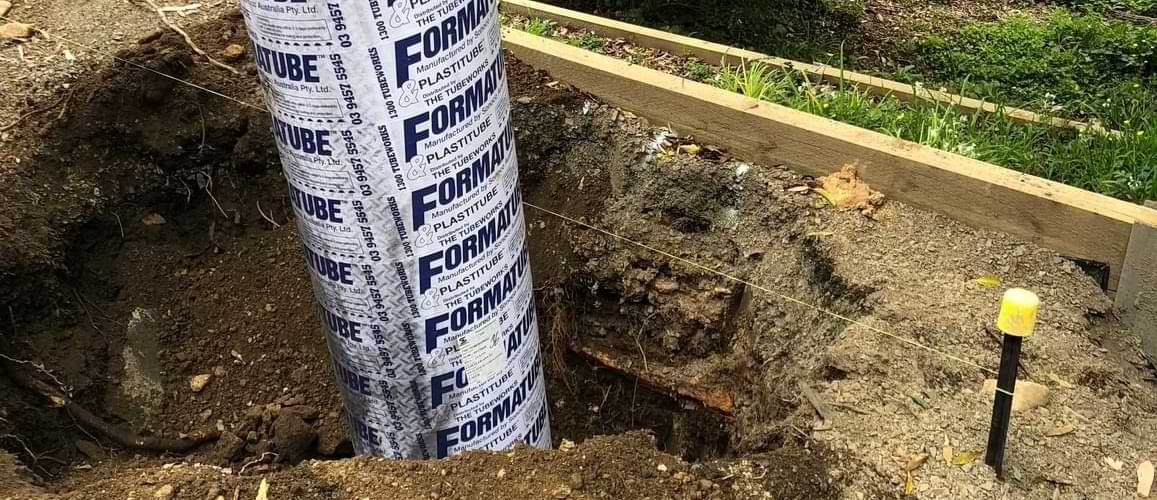Concrete Foundations
Your home’s footings and foundations play a colossal role in the safety and value of your property. Remember, your home’s structure and foundation must work together to avoid disastrous problems. Therefore, you need to understand the three types of concrete house foundations available.
Three Types of Foundation
Slab Foundation
A slab foundation is the most common type of house foundation. Because it is fairly simple to create, it’s also the most affordable choice. The concrete block or slab used for the foundation is about 15- to 20-centimetres thick. It is poured directly on a bed of gravel to facilitate drainage. There are, however, three additional variants of slab foundations.
- T-Shaped
- Slab-on-Grade/Monolithic Slab
- Frost Protected
The T-shaped foundation is typically used to support structures in areas where the ground often freezes. A concrete footing is laid beneath the frost line and then the walls are built on top. A T-shaped base is then attached, with time allowed for it to cure. The walls are then built up until, finally, the concrete is poured between the walls to firm up and solidify the concrete block foundation.
The slab-on-grade method is commonly used in areas where the ground does not freeze. In some cases, slab-on-grades can be used in areas with some frost by adding insulation to protect the concrete from cracking.
Frost-protected foundations can only work with heated structures. It prevents frost forming on the ground by using polystyrene insulation on the base and along the foundation wall.
Crawl Space Foundation
This type of foundation creates an open space underneath the building, lifting the structure off the ground. Crawl space foundations are brilliant for areas with high water tables or at high risk of flooding. It helps stabilise the building even if soil shifts during rainy seasons. Flood vents are also added to prevent any floodwater from entering your house. It also allows for air circulation under the house, helping keep your home cool on hotter days.
Basement Foundation
A basement foundation requires a lot of digging. Typically, it will need to be about 2.4 metres down. However, the space can be turned into a room with concrete flooring and walls. The process includes laying a concrete footing to support and strengthen the walls. The walls, made of poured concrete over concrete blocks, are then erected. Lastly, the concrete slab is poured on the floor. The basement can then be used as an extra room, such as for storage or as a living space.
Site Considerations
Not all sites are suitable for all types of concrete foundations. There are some things you need to take into consideration about your property. Otherwise, you may need to learn how to fix cracks in your concrete foundation to ensure the stability and safety of your home.Water Tables
A groundwater table is a boundary between unsaturated and saturated soil. They rise and fall depending on your lot and the seasons. Depending on the groundwater table and your lot, there may be issues regarding drainage. For instance, if water is seeping out of the ground, it could damage your home’s foundation. Therefore, for properties with high water tables, crawl space foundations are a good option.Soil Conditions
You must take into consideration your soil’s condition when building concrete foundations. This includes the type of soil, for instance, whether it is sandy or not; the different layers of soil; and the hardness of the soil. Understanding your soil’s condition will help you choose the right foundation type. For instance, if the ground is soft, more work will be required to create strong and stable footings and foundations.Local Climate
Along with water tables and soil conditions, you need to be aware of the local climate before deciding on a concrete foundation. Some foundations are designed to suit specific climates. For example, slab-on-grade works best for moderate to tropical temperatures. On the other hand, T-shaped and frost-protected foundations are specifically designed for areas where frost on the ground is an issue.Let us help you
Need help building concrete foundations in East Melbourne? JMC Concrete not only specialises in concrete slabs and foundations, but we also offer other services like; concrete removals and repairs, concrete shed slabs, driveways and more.
Need a quote? Talk to our concrete driveway contractors now!
   